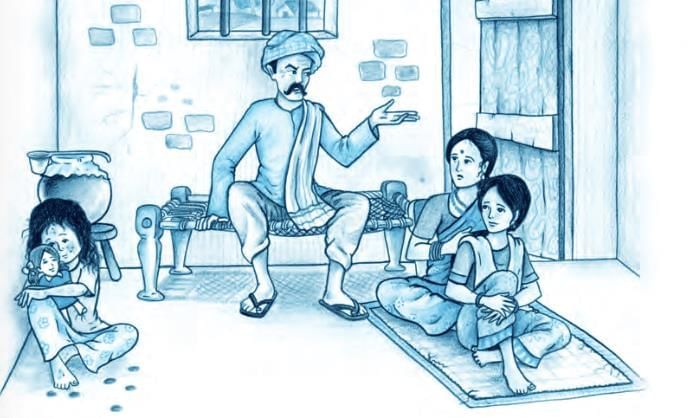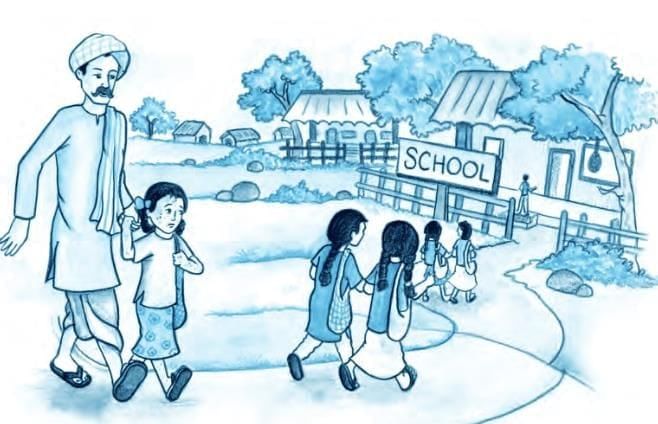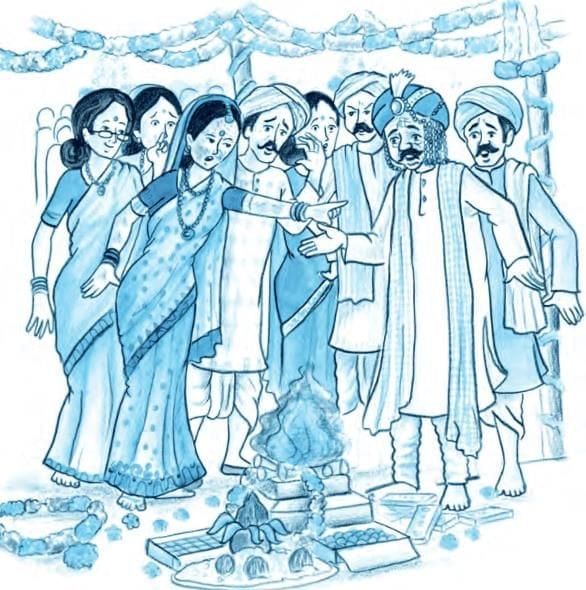NCERT Solutions for Class 10 English Footprints Without Feet Chapter 8 - Bholi
Read and Find Out - Page No. 47
Q1: Why is Bholi’s father worried about her?
Ans: Bholi was not like other children. She fell off a cot as a child due to which her brain was slightly damaged. She learnt to speak very late and used to stammer. Her face and whole body was covered with pockmarks. Thus, her father was worried about her marriage prospects.
Q2: For what unusual reasons is Bholi sent to school?
Ans: The Tehsildar had ordered Bholi’s father, Ramlal, to send his daughters to school to set a good example. Ramlal’s wife was worried that sending their daughters to school might affect their chances of getting married. However, she agreed to send Bholi to school, thinking that with her lack of beauty and intelligence, Bholi’s chances of marriage were already less. As a result, Bholi was sent to school.
Read and Find Out - Page No. 48
Q1: Does Bholi enjoy her first day at school?
Ans: Yes, Bholi enjoyed her first day at school. Bholi was terrified when she arrived at school. She felt a little more at ease when she saw other females at school and realised she might make some nice friends. When the teacher questioned her name and she stammered, the other girls teased her, making her feel embarrassed. She returned home delighted, though, because the teacher encouraged her to study and attend school daily to grow more knowledgeable and confident.
Yes, Bholi enjoyed her first day of school because she was relieved to see so many girls her age there. She hoped to make friends with one of these young ladies.
Q2: Does she find her teacher different from the people at home?
Ans: Yes, Bholi found her teacher to be very different from the people at home. At home, no one ever spoke to her kindly, but her teacher talked to her gently and soothingly. At home, she was often ridiculed for stammering, but her teacher encouraged her to speak confidently instead of mocking her. This kindness deeply touched Bholi’s heart.
Read and Find Out - Page No. 51
Q1: Why do Bholi’s parents accept Bishamber’s marriage proposal?
Ans: Bholi’s parents agreed to Bishamber’s marriage proposal because they feared that Bholi might never receive another proposal and could remain unmarried for the rest of her life. Bishamber was a prosperous grocer and hadn't demanded any dowry, which made the proposal even more appealing to them.
Q2: Why does the marriage not take place?
Ans: At the time of marriage, Bishamber asked for a dowry of five thousand rupees because he saw Bholi’s pock-marked face. Ramlal had no choice but to pay. But Bholi refused to marry the greedy man. She asserted her rights and dignity. Thus, the marriage party was turned away.
Think about It - Page No. 55
Q1: Bholi had many apprehensions about going to school. What made her feel that she was going to a better place than her home?
Ans: Bholi had many apprehensions about going to school. The day she was going to school forced her parents to dress her nicely. She was bathed and her hair was properly done. Until then she was not being taken care of. The special treatment she received made her feel that she was going to a better place.
Q2: How did Bholi’s teacher play an important role in changing the course of her life?
Ans: Bholi's teacher played an important role in changing the course of her life. She was polite and friendly which touched her heart. She encouraged her every time and was affectionate towards her and said Bholi to put her fears of not being able to speak aside. The teacher transformed her into a confident person who could read, write, and speak clearly.
Q3: Why did Bholi at first agree to an unequal match? Why did she later reject the marriage? What does this tell us about her?
Ans: Bholi at first agreed to an unequal match because she was lucky to get a well-to-do bridegroom who owned a big shop, had a house of his own, and had several thousand in the bank. Moreover, he was not asking for any dowry. Bholi also heard her mother saying that he did not know about her pock-marks and her lack of sense. If the proposal was not accepted, she might remain unmarried all her life. She later rejected the marriage because the bridegroom demanded five thousand rupees as dowry. On seeing the father pleading and humiliated she decided not to marry him.
Q4: Bholi’s real name is Sulekha. We are told this right at the beginning. But only in the last but one paragraph of the story is Bholi called Sulekha again. Why do you think she is called Sulekha at that point in the story?
Ans: The word Bholi means a simpleton. Throughout the story, she had been a simpleton hardly expressing her opinion. The word Sulekha means a person with a beautiful sense of letters. In this story, this word has a larger meaning of being a literate intelligent, and mature individual. After her education Bholi has changed to Sulekha and her assertion during the marriage is her announcement to the world that she is no more a Bholi but a Sulekha.
Q5. Bholi’s story must have moved you. Do you think girl children are not treated at par with boys? You are aware that the government has introduced a scheme to save the girl child as the sex ratio is declining. The scheme is called Beti Bachao Beti Padhao, Save the Girl Child. Read about the scheme and design a poster in groups of four and display it on the school notice board.
Ans: Do it Yourself!
Talk About It
Q1. Bholi’s teacher helped her overcome social barriers by encouraging and motivating her. How do you think you can contribute towards changing the social attitudes illustrated in this story?
Ans: We can help to change the social attitudes depicted in the story by ensuring that both girls and boys are aware of their rights and treating them equally. Furthermore, ensuring that they have equitable access to education and jobs. Also by refusing to pay dowry
Q2. Should girls be aware of their rights, and assert them? Should girls and boys have the same rights, duties, and privileges? What are some of the ways in which society treats them differently? When we speak of human rights, do we differentiate between girls’ rights and boys’ rights?
Ans: Yes, young women should be aware of and express their rights. The rights, responsibilities, and privileges of girls and boys must be equal. Boys and girls are treated differently, particularly in villages and small towns. In comparison to girls, parents tend to spend more on their sons' education. They instil in their daughters the values of politeness, calmness, and mastery of home responsibilities. When we talk about "human rights," the law does not distinguish between girls' and boys' rights. However, this disparity exists in society.
Q3. Do you think the characters in the story were speaking to each other in English? If not, in which language were they speaking? (You can get clues from the names of the persons and the nonEnglish words used in the story.)
Ans: No, the story's characters did not communicate with one another in English. Pitaji, tehsildar, izzat, numberdar, and other words in the text suggest that the story's characters were speaking in Hindi.
|
61 videos|893 docs|69 tests
|
FAQs on NCERT Solutions for Class 10 English Footprints Without Feet Chapter 8 - Bholi
| 1. What is the main theme of the story "Bholi"? |  |
| 2. How does Bholi’s character develop throughout the story? |  |
| 3. What role does education play in Bholi's life? |  |
| 4. How does the society in "Bholi" reflect on the treatment of differently-abled individuals? |  |
| 5. What message does the author convey through Bholi's rejection of an arranged marriage? |  |

















